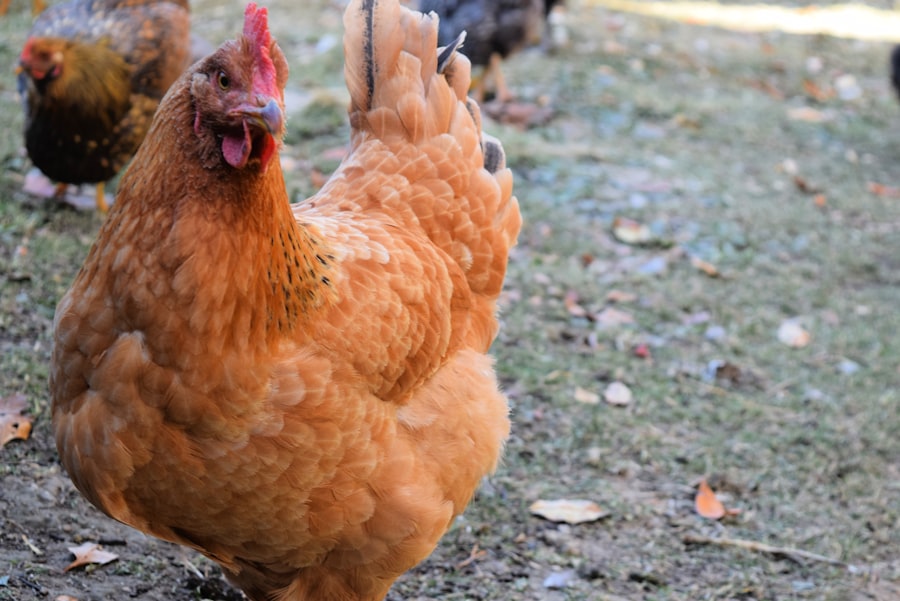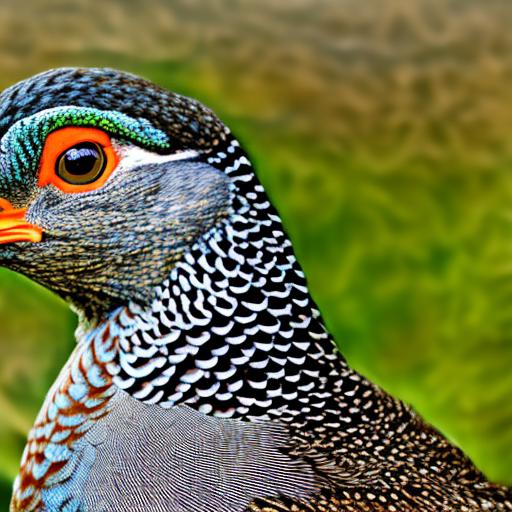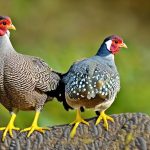Guinea fowl are unique and fascinating birds that are often kept for their pest control abilities, as well as for their delicious meat and eggs. When it comes to raising guinea fowl, one of the key decisions that poultry keepers must make is whether to keep their birds locked up or allow them to free-range. Keeping guinea fowl locked up involves confining them to a coop or run, while free-ranging allows the birds to roam and forage at will. Both options have their pros and cons, and the decision ultimately depends on the specific needs and circumstances of the poultry keeper. In this article, we will explore the reasons for locking guinea fowl up, the ideal duration for confinement, considerations for free-ranging, potential risks of confinement, and tips for keeping guinea fowl safe and happy while locked up.
Key Takeaways
- Keeping guinea fowl locked up is important for their safety and protection from predators.
- Locking guinea fowl up at night is essential to prevent them from wandering and becoming vulnerable to predators.
- Guinea fowl should be locked up for at least 12 hours a day to ensure they get enough rest and stay safe.
- Free-ranging guinea fowl can help control pests and insects in the area, but they should be supervised to avoid potential risks.
- Potential risks of keeping guinea fowl locked up include stress, boredom, and lack of exercise, which can lead to health issues.
- To keep guinea fowl safe and happy while locked up, provide them with a spacious and clean enclosure, fresh water, and enrichment activities.
- In conclusion, locking up guinea fowl is necessary for their safety, but it’s important to consider their well-being and provide a suitable environment for them.
Reasons for Locking Guinea Fowl Up
There are several reasons why poultry keepers may choose to keep their guinea fowl locked up. One of the primary reasons is for protection from predators. Guinea fowl are vulnerable to a wide range of predators, including foxes, raccoons, hawks, and even domestic dogs. By keeping the birds confined to a secure coop or run, poultry keepers can minimize the risk of predation and ensure the safety of their flock. Additionally, locking guinea fowl up can help prevent them from wandering onto neighboring properties or roads, where they may be at risk of injury or causing nuisance to others. Another reason for confinement is to control the birds’ access to certain areas or resources. For example, poultry keepers may want to prevent their guinea fowl from damaging gardens, crops, or landscaping, or from accessing areas where they may be at risk of poisoning or injury. By keeping the birds locked up, poultry keepers can manage their impact on the environment and ensure that they have access to appropriate food, water, and shelter.
On the other hand, there are also reasons why some poultry keepers may choose to allow their guinea fowl to free-range. Free-ranging allows the birds to exhibit natural behaviors, such as foraging, dust bathing, and socializing, which can contribute to their overall health and well-being. Additionally, free-ranging guinea fowl can help control pests such as ticks, grasshoppers, and other insects, making them valuable allies in integrated pest management. However, free-ranging also comes with its own set of challenges, including increased risk of predation, exposure to toxins and hazards, and potential conflicts with neighbors or other animals. Ultimately, the decision to lock guinea fowl up or allow them to free-range depends on a variety of factors, including the specific goals and circumstances of the poultry keeper.
Ideal Duration for Locking Guinea Fowl Up
The ideal duration for locking guinea fowl up depends on a variety of factors, including the specific needs and circumstances of the birds and their keepers. In general, guinea fowl should be locked up during the night to protect them from nocturnal predators and ensure that they have a safe and secure place to roost. Additionally, locking the birds up at night can help prevent them from disturbing neighbors with their loud calls and reduce the risk of them wandering off or getting into mischief. During the day, the duration of confinement depends on factors such as the size and quality of the coop or run, the availability of food and water, and the presence of potential hazards or predators in the surrounding area.
Some poultry keepers may choose to allow their guinea fowl to free-range during the day while locking them up at night, while others may prefer to keep the birds confined at all times. Ultimately, the ideal duration for locking guinea fowl up is a balance between providing them with necessary protection and security while also allowing them opportunities for exercise, foraging, and social interaction. Poultry keepers should carefully consider the specific needs and behaviors of their guinea fowl when determining the ideal duration for confinement.
Considerations for Free-Ranging Guinea Fowl
When considering whether to allow guinea fowl to free-range, poultry keepers should take into account a variety of factors that can impact the birds’ safety and well-being. One important consideration is the presence of predators in the area. Guinea fowl are vulnerable to a wide range of predators, including foxes, raccoons, hawks, and even domestic dogs. Poultry keepers should assess the level of predation risk in their area and take appropriate measures to protect their birds, such as providing secure fencing, predator-proof coops or shelters, and supervision during free-ranging periods.
Another consideration is the availability of suitable foraging opportunities. Guinea fowl are natural foragers that require access to a diverse range of insects, seeds, plants, and other natural foods to meet their nutritional needs and exhibit natural behaviors. Poultry keepers should ensure that their birds have access to suitable foraging areas that are free from toxins and hazards and provide opportunities for exercise and mental stimulation.
Additionally, poultry keepers should consider the potential impact of free-ranging guinea fowl on neighbors and the surrounding environment. Guinea fowl are known for their loud calls and can be quite vocal, which may disturb nearby residents or cause conflicts with other animals. Poultry keepers should communicate with neighbors and take steps to minimize any potential nuisance caused by their birds.
Potential Risks of Keeping Guinea Fowl Locked Up
While locking guinea fowl up can provide protection and security for the birds, it also comes with its own set of potential risks and challenges. One potential risk is the development of behavioral issues due to confinement. Guinea fowl are active and social birds that require opportunities for exercise, mental stimulation, and social interaction to maintain their health and well-being. Prolonged confinement in a small or barren space can lead to boredom, stress, aggression, feather picking, or other behavioral problems in guinea fowl.
Another potential risk is the spread of disease in confined flocks. When guinea fowl are kept in close quarters, such as in a small coop or run, there is an increased risk of disease transmission among the birds. Poultry keepers should take appropriate measures to maintain good hygiene and sanitation in their coops and runs, provide adequate ventilation and space for the birds, and monitor their flock for signs of illness.
Additionally, prolonged confinement can lead to physical health issues in guinea fowl, such as obesity, foot problems, or reduced egg production. Poultry keepers should provide appropriate space, enrichment, and opportunities for exercise to prevent these issues.
Tips for Keeping Guinea Fowl Safe and Happy While Locked Up

There are several tips that poultry keepers can follow to ensure that their guinea fowl remain safe and happy while locked up. One important tip is to provide a spacious and secure coop or run that allows the birds plenty of room to move around, perch, dust bathe, and exhibit natural behaviors. The coop or run should be predator-proof and provide protection from the elements while also allowing for adequate ventilation and natural light.
Another tip is to provide enrichment and stimulation for confined guinea fowl. Poultry keepers can provide perches, roosts, dust bathing areas, hanging toys or treats, and other forms of environmental enrichment to keep their birds mentally and physically engaged.
Additionally, poultry keepers should ensure that their confined guinea fowl have access to fresh water at all times and a balanced diet that meets their nutritional needs. Providing a variety of foods such as grains, seeds, fruits, vegetables, insects, and commercial poultry feed can help keep the birds healthy and satisfied.
Poultry keepers should also monitor their confined guinea fowl regularly for signs of stress, illness, or behavioral issues and take appropriate action if any concerns arise.
Conclusion and Summary
In conclusion, whether to lock guinea fowl up or allow them to free-range is a decision that depends on a variety of factors including predation risk, foraging opportunities, environmental impact, and specific goals of poultry keepers. Locking guinea fowl up can provide protection from predators and hazards while also allowing poultry keepers to manage their impact on the environment. However, it also comes with potential risks such as behavioral issues, disease transmission, and physical health problems in confined birds.
Poultry keepers can take steps to ensure that their guinea fowl remain safe and happy while locked up by providing a spacious and secure coop or run with enrichment opportunities, a balanced diet, fresh water, and regular monitoring. Ultimately, whether locked up or free-ranging, guinea fowl require careful consideration and management to ensure their well-being and success in a domestic setting.
When it comes to keeping guinea fowl locked up, it’s important to consider their safety and well-being. A related article on PoultryWizard.com discusses the best coop for chickens, which can also provide valuable insights for housing guinea fowl. The article explores different coop designs and features that can ensure the comfort and security of poultry, including guinea fowl. Check out the article here for more tips on creating a suitable living space for your feathered friends.
FAQs
How long should guinea fowl be kept locked up?
Guinea fowl should be kept locked up for a minimum of 6-8 weeks to allow them to acclimate to their new surroundings and recognize it as their home.
Why should guinea fowl be kept locked up?
Keeping guinea fowl locked up helps them to become familiar with their new environment, reduces the risk of them wandering off and getting lost, and protects them from predators.
What factors should be considered when deciding how long to keep guinea fowl locked up?
Factors to consider include the age of the guinea fowl, the size of the enclosure, the presence of predators in the area, and the availability of food and water.
Can guinea fowl be let out to free range after being locked up?
Yes, once guinea fowl have been kept locked up for the recommended period of time, they can be let out to free range during the day while being secured in a coop at night for their safety.
What are the benefits of keeping guinea fowl locked up for a period of time?
Keeping guinea fowl locked up allows them to become familiar with their new surroundings, reduces the risk of them wandering off and getting lost, and helps to protect them from predators.
Meet Walter, the feathered-friend fanatic of Florida! Nestled in the sunshine state, Walter struts through life with his feathered companions, clucking his way to happiness. With a coop that’s fancier than a five-star hotel, he’s the Don Juan of the chicken world. When he’s not teaching his hens to do the cha-cha, you’ll find him in a heated debate with his prized rooster, Sir Clucks-a-Lot. Walter’s poultry passion is no yolk; he’s the sunny-side-up guy you never knew you needed in your flock of friends!







